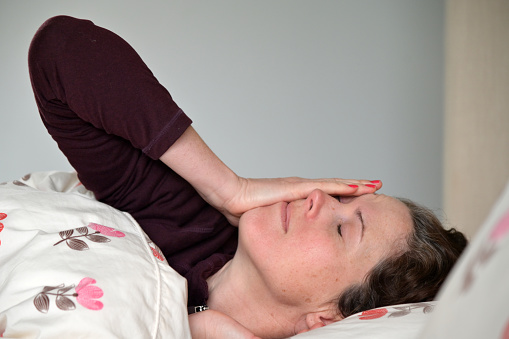Does Food Affect Your Sleep?
Would you change your diet if you knew it would help you get a full night of uninterrupted sleep?

Sleep can be elusive, but could your diet be to blame? The foods you choose to eat, how much you eat, and when, all can affect your sleep.
You can find out here just how your food choices may be influencing how rested you feel each morning.
Eat some tryptophan before bed
You’ve probably heard about the sleep-inducing powers of tryptophan, and is an essential amino acid. Your body can’t produce it by itself, so it needs to find it in the food you eat.
Tryptophan can be made into serotonin, which can in turn be made into the melatonin hormone. Melatonin regulates your sleep-wake cycle.
Your body produces it mostly between the hours of 3 a.m. and 4 a.m. Most importantly melatonin triggers sleepiness, but to get your tryptophan in a way that your body can use it to produce melatonin, your body needs some extra help.
Good sources are turkey, chicken, minced beef, milk, nuts and seeds, honey, and even bananas.
Have a light, carbohydrate snack
If you’re searching for sleep, tryptophan has an ally that needs special attention. Carbohydrates eaten with tryptophan can reliably induce sleep-inducing serotonin.
When you eat a protein source containing tryptophan, the amino acids from the protein must compete to get through your body’s blood-brain barrier. That makes it less likely the tryptophan you eat will be converted into serotonin.
However, eating carbohydrates triggers insulin and that lowers the amino acids in your blood—except tryptophan. In other words carbohydrates clear the way for tryptophan to enter the brain.
While carbohydrates with protein help make you sleepy, it’s important for your overall health to choose healthy ones.
Whole-grain crackers and fresh fruit are a good examples of a healthy bedtime snack, or milk and crackers, or a few lean bites of chicken with an orange or banana.
Should you snack before bedtime?
Is it a good idea to go to bed hungry? Even if a little calming food sounds relaxing, you may fear gaining weight from midnight snacking.
This is a tricky situation you will want to handle carefully. If you find yourself binging on high-calorie foods late at night, this can indeed promote unhealthy weight gain. It can also make it tougher to sleep, especially if you experience heartburn.
However, insomnia can be worse on an empty stomach. Going to bed without eating can make it harder to fall asleep, and also leaves you prone to waking up in the middle of the night more frequently from hunger.
Also, if weight is a concern for you, studies show that inadequate sleep stimulates the hunger hormone ghrelin. So if you can’t sleep well on an empty stomach, you may make up for it the next day by eating too much.
The solution is to go to bed with some food in your stomach, but not too much. Try a light snack instead of an all-out food fest. If your light snack isn’t satisfying, see if a high-fibre light snack helps. Fibre slows down your digestion, leaving you feeling full longer with fewer calories.
Fatty foods can harm your sleep
This tip doesn’t rely on when you eat. If your overall diet relies on fat—especially saturated fat—for nutrition, you may be depriving yourself of good, quality sleep.
When your daily nutrition includes a high percentage of saturated fat, you spend less time in the stage of deep sleep known as slow wave sleep.
This is the non-REM sleep you get earlier in your sleep cycle, and it matters. Your brain reinforces things you learn during the day while you sleep.
Studies have shown that missing out on slow wave sleep makes you remember less, which makes learning more difficult.
Avoid sneaky caffeine sources
You probably know drinking a pot of coffee before bed is a bad idea if you want to actually sleep. But caffeine lies waiting in other foods you may not suspect.
A cup of hot cocoa before bed sounds soothing, but cocoa is made from chocolate, and chocolate has caffeine. Caffeine hides in many beverages you may not guess, like some soft drinks or energy drinks.
So check the label to make sure you aren’t accidentally stimulating your brain when you’d rather be calming it.
Is your medicine caffeinated?
If you have a headache before bed, you might not think twice before taking some pain relief but many pain and headache drugs contain this stimulant as well.
So do some cold medicines, weight loss pills, and diuretics well as some herbal remedies too. Caffeine lasts a long time in your body, too, so a caffeinated medication taken in the afternoon could still interfere with sleep.
The best way to prevent accidental caffeine is to read the label of each medication carefully.
Approach nightcaps with caution
Alcohol’s relationship to sleep is extremely complicated. Although it’s been studied since the 1930s, scientists are still searching for answers about the relationship alcohol has with your sleep quality. All of those studies have taught us a few things, though.
First, alcohol makes it easier to fall asleep quickly. That’s true whether you have one drink or several. Second, alcohol disrupts your second half of sleep.
One theory suggests your body adapts to the sedative effects of alcohol during the first half of your sleep cycle, and continues to attempt to adapt during the second half even though it has processed the alcohol out of your bloodstream.
Third, when you drink a moderate to high amount of alcohol, your REM sleep stage shortens (your dreaming stage), while your slow wave sleep increases.
Fourth, your body becomes more resistant to the sleep-inducing effects of alcohol after just three nights of drinking.
There are hints of other effects, too so if you drink heavily, you may be more likely to snore, and that can harm your sleep quality. You may also wake up more frequently and earlier after a night of heavy drinking.
You may be less rested the next day, and this may slightly impair your concentration.
It’s possible that insomniacs sleep better with one to two drinks before bed, but the same amount may be more disruptive for healthy adults.
Over 60’s should be particularly cautious around alcohol at bedtime, because they require less alcohol to feel the same effects, and because they may wake up still under the effect of alcohol, which increases their risk of falling.
Spicy foods can disrupt sleep
Eating spicy food right before bed can sabotage your sleep. That’s because spicy foods can bring on heartburn, and heartburn pain can rouse you from your peaceful slumber.
Researchers asked hundreds of college students if the foods they ate provoked disturbing dreams. They found that about 18% of the students did report vivid or disturbing dreams after eating a particular food. Of those, about 20% said the food causing these dreams was spicy so something to bear in mind?
Heartburn trouble? Avoid acidic food
Ever wake up with a burning sensation in the back of your throat? That could be heartburn, a common cause of interrupted sleep.
Some foods are more likely to provoke heartburn than others and highly acidic foods count among them. To prevent heartburn, avoid these foods close to bedtime:
– Citrus fruits (lemons, oranges, grapefruits)
– Tomatoes (marinara sauce, ketchup, tomato soup)
– Marinated foods (pickles, olives)
– Dairy products (milk, yogurt, cheese)
You may not need to cut all of these out but check as some may trigger your acid reflux worse than others.
To find the foods causing your pain, keep a journal and write down what you ate every time you experience heartburn.
Protein pros and cons
Protein seems to help you fall asleep faster, but it may depend on what comes with it. Researchers studied how long it took their subjects to fall asleep, first giving them their food for the day, and then letting the subjects choose their own meals.
The meals the scientists fed them were higher in protein, but lower in saturated fats than the self-selected meals. The results? People who ate the high-protein, low-saturated-fat meals throughout the day fell asleep 12 minutes faster on average.
The trick is to get plenty of protein from your diet, and to limit saturated fats.
Avoid liquids before bedtime
You’re all settled in. The house is quiet, the bed cozy, you’ve eaten healthy, nutritious foods, but not too much. You’re just about to drift into a deep, restorative slumber, but then nature calls.
If you hadn’t had that big glass of water right before bed, you wouldn’t have to get up right now. But what if you’re thirsty?
If you frequently find yourself waking up in the middle of the night to visit the bathroom, it’s time to start planning ahead. Make sure you’re well-hydrated well before you turn the lights out.
At least two hours before bedtime, start limiting your liquids. Get enough water before that time, and limit your alcohol to one drink or less during that window. Of course you will want to abstain from any drink with caffeine too.
Don’t smoke, especially at night
Smokers are sometimes lured to the garden just before bed for one more cigarette. The nicotine may feel soothing in the moment, but don’t forget—it’s a stimulant. It makes your heart beat faster, and will make falling asleep more difficult for you.
Nicotine—the addictive ingredient in cigarettes—has been shown to mess with the biological clock found in the genes of mice. In one study it disturbed the rodents’ natural sleep rhythms, making it harder for them to get to sleep.
Some of those disturbances are permanent. Is it doing the same to you?
Another concern is sleep apnoea, a condition in which you are periodically deprived of oxygen throughout the night. Smokers are 2.5 times more likely to have it.
Eat better throughout the day
We’ve mostly focused on foods you eat right before bed. But that doesn’t tell the whole story. Studies show that the nutritional quality of your food throughout the day makes a difference at night.
The more calories you get from sugar and saturated fat, the more likely you are to experience sleep disturbances. On the other hand, diets high in fibre and protein seem to help you fall asleep and stay asleep throughout the night.
Sleeping pills
Sleeping pills are a tempting solution for sleeping problems. Used correctly, they may help you develop a more regular sleep pattern and help you sleep better.
But if they aren’t used carefully, sleeping pills can cause more problems.You want to approach these drugs with caution: many of them are addictive. This is why most people use them only for a short time.
Helpful information:
I do hope there is some relief for you here, as lack of sleep has such a powerful impact on our overall health.
Certainly bioidentical progesterone helps us relax and if you are going through a period of poor sleep you might find it helpful to slightly increase your dosage of cream at night and to try adding in a herbal aid such as Wellsprings Sleep Capsules.
This article may also give you a few more ideas.
https://anna.blog.wellsprings-health.com/how-to-help-yourself-after-a-bad-nights-sleep/



















